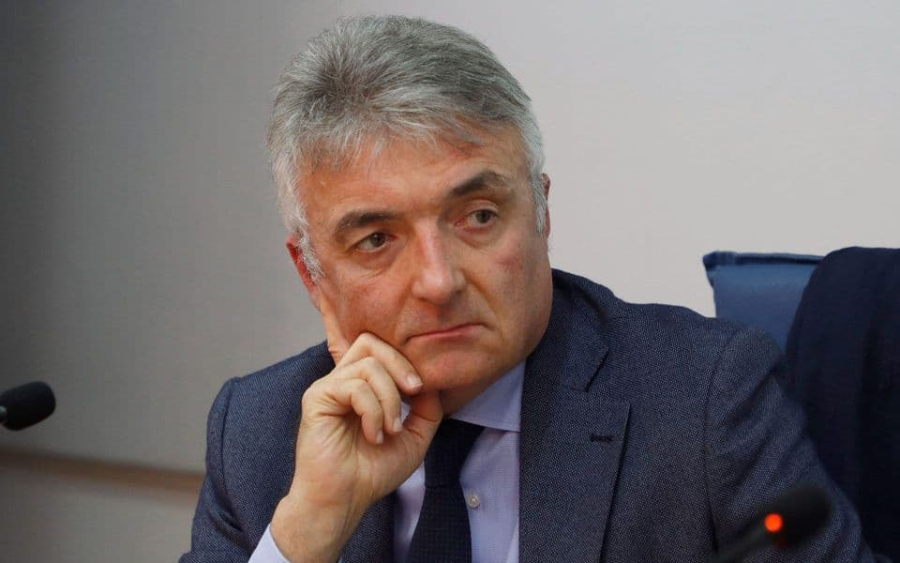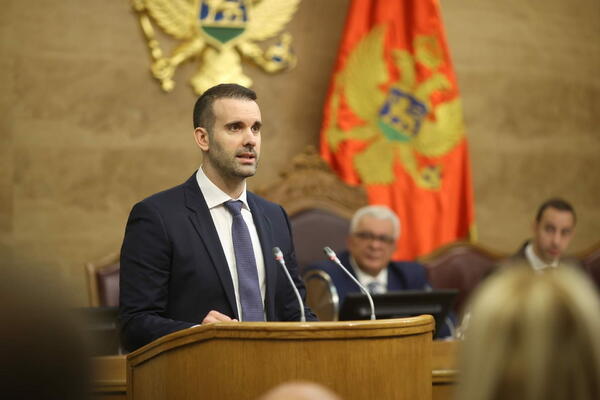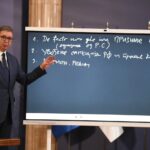When, during the mandate of the 42nd Government of Montenegro, Prime Minister Zdravko Krivokapić, the Minister of Justice Vladimir Leposavić was dismissed because of his statement in the Parliament that genocide did not take place in Srebrenica in July 1995, it was difficult to assume that this issue would ever burden the Montenegrin political “elite” again, at least when it comes to the majority of parliamentary parties.
It is true that during the adoption of the Resolution of the Parliament of Montenegro on the genocide in Srebrenica, in June 2021, there were abstentions and those who were against (a reminder: 55 voted for, 18 against, 6 abstained), but it was considered – now it is clear: prematurely and baselessly – that this issue, despite the resistance and severe discomfort of the representatives of the Greater Serbian national-chauvinist politics, has been overcome forever in the context of the official Montenegrin policy and the position regarding that Magnum Crimen.
Almost three years after the Srebrenica massacre, the initiative of Germany and Rwanda to adopt a document in the United Nations that will commemorate, in an appropriate way, the tragic events and genocide in Srebrenica, which, in the meantime, has been joined by a large number of important member states of UN as “co-sponsors”, but also smaller member-countries, too – from practically all continents, including all the countries of the former Yugoslavia and the Western Balkans that have a seat in the world organization.
Everyone, except Serbia and except Montenegro.
The ideology, logic and rhetoric of the authorities in Belgrade, on this occasion, do not represent any surprise. The vehement rejection of the regime of Aleksandar Vučić, and his services, media and service partner/leader – the Church of Serbia, in a pattern that in everything resembles Putin’s mechanisms and levers of power, is the inevitable result of all the things – not only in the last twelve years of the authorities in Serbia, but and for a much longer period, and even before the genocide in Srebrenica – that were determinants of official Serbian ideology and politics.
Vučić will even send a “team to fight against the Resolution” to New York, and his appearances at the UN Security Council and statements in the corridors will have tragic-comic consequences. The Serbian diplomatic defeat is visible to everyone, and even to the rabid media in Serbia, which (still) do not find a formula to turn it, according to a custom that is not foreign to Serbian political culture, into a “glorious victory”, with many heroic victims.
All this did not have a positive effect on the attitudes, positions and behavior of representatives of the 44th Montenegrin government, which, in this segment of activity, is represented by the Minister of Foreign Affairs, Filip Ivanović, in addition to Prime Minister Milojko Spajić. On the contrary – both the minister and the prime minister, with their statements, showed that the revisionist and negativist attitude towards the truth about the genocide in Srebrenica is still very much alive and tough.
Therefore, when it comes to the understanding of genocide and the formulation of the official position, the stage is a general political, social and cultural regression of worrying proportions, which shows the deep contamination of Montenegrin society and politics with nationalist and national-chauvinist ideas, which are mostly recognized in the phrase “Serbian world”.
There is also a new tactic of political forces that do not want Montenegro to be a co-sponsor of the UN Resolution. They do not deny the Srebrenica genocide, as explicitly and fervently repeated by the regime in Belgrade and, among others, the Serbian-Russian media outlets in Montenegro, but have decided to remain silent about it and ignore that the problem exists at all.
This type of attempt was first expressed by the Minister of Foreign Affairs, Mr. Ivanović, whose appearance in the Assembly (“why would Montenegro be a co-sponsor, when it – at that moment – was not even Bosnia and Herzegovina?”), which was met with a harsh response from the pro-European opposition.
Prime Minister, Mr. Spajić was no better: his precisely uncultured and ill-mannered behavior when he was asked about it at the press conference by the Al Jazeera Balkans journalist, only confirmed the painful truth: this Government of Montenegro does not want the Resolution to be even mentioned, let alone to publicly express the supportive attitude. Co-sponsorship, now it is also clear, is out of question.
Thus, the Montenegrin diplomats, who are members of the Permanent Mission of Montenegro to the UN, are among the few (in addition to, with all due respect, the few African and Asian countries) who have neither an opinion nor knowledge about how they will vote when the Resolution is finally on the agenda – and now it is clear that it will be in the middle of May this year, due to additional consultations on some wording in the text itself.
The political implications for Montenegro regarding this situation are, therefore, worryingly clear.
First, there has been a quiet but effective regression regarding the relationship of Montenegrin politics towards some indisputable civilizational issues and problems.
Second, the influence from Serbia – political, ideological, security and propaganda – has increased. It is no longer so visible “prima facie”, but it is very effective. The synchronized activity of a whole range of promoters and proxies – from the media to the Church of Serbia – achieved a great impact on political structures.
Thirdly, the government structure itself has gained a new balance: the officially leading Europe Now Movement (PES) has, in fact, become dependent on the views, opinions and interests of the coalition Together for the Future of Montenegro (ZBCG), led by Vučić-Putin’s epigones and followers Andrija Mandić and Milan Knežević. Spajić is just a ‘frontman’ in an orchestra where others determine the sheet music. His ignoring of difficult political issues becomes farcical.
Fourth, in response to the announced reconstruction of the Government and the possibility that Montenegro will receive the so-called IBAR (i.e. Interim Benchmarks Assessment Report) by the EU – it is shown that, even in these processes, the PES is closer to the position of a political hostage, than the captain who sovereignly steers the Montenegrin state ship.
Finally, fifth, there is the western part of the international community, which observes all this with a dose of inertia, which worries everyone, especially the pro-European and pro-Western Montenegrin opposition.
The reasons for Montenegro’s support and co-sponsorship of the UN Resolution on the genocide in Srebrenica are clear, both on a day-to-day political level, but, even more importantly, on a strategic and historical one. Of course, they also concern the fact that Montenegro is a multi-ethnic and multi-confessional civil society, i.e. that it should remain so. It is, therefore, about the most important segment of the future of everyone living in Montenegro.
And precisely because of those values and principles, it is endangered, i.e. eliminated the possibility of co-sponsorship from the government in Podgorica. That moment, therefore, shows all the drama and gravity of the political and security situation in Montenegro.
The current government, aligned with Belgrade and the Kremlin, is not only betraying Montenegrin tradition and history. She is a traitor of the very future of sovereign and independent Montenegro.
The articles published in the “Opinions” column reflect the personal opinion of the author and may not coincide with the position of the Center
Miodrag Vlahović. Montenegrin politician and former diplomat. The first Minister of Foreign Affairs of Montenegro. Former Montenegro’s Ambassador to the USA, Canada, Iceland, Holy See, Order of Malta.




